
ALI NABIZADEH VS BARRY WERNER
Summary: Attorney Paul Bigley of the Freeman Mathis Gary law firm is listed by the court as the attorney representing the defendants. Plaintiff served discovery requests but no objections were made by Bigley or his firm and no responses were provided by his clients. Plaintiff sent a meet and confer letter but received no response. Plaintiff filed a motion to compel and no opposition was made.
The judge issued a tentative ruling sanctioning defendants and their counsel $1560. The parties submitted to the tentative ruling and it became a final court order.
Update:
In an odd twist, another attorney, Jason Dineros, has since come forward to claim that he, and not Paul Bigley, was the responsible defense attorney. His comment to Lawzilla:
"Please be advised that I was the assigned and handling partner of Nabizadeh v Werner - NOT Paul Bigley, who was inadvertently listed at the top of the pleading. I signed the responsive pleading and was the handling attorney, which plaintiff's counsel will confirm. Although correspondence may have been directed to Mr. Bigley, since I was the overseeing and handling partner. any such correspondence or pleadings would have come to me and would have never made it across Mr. Bigley's desk."
Interestingly, at the time these events occurred, not only did the court list Paul Bigley as the responsible attorney, the opposing attorney in a declaration under penalty of perjury filed with the court said Paul Bigley was the defense attorney, and the judge in a court order sanctioned Paul Bigley - none of which Mr. Bigley, Mr. Dineros, or their law firm opposed or sought to correct at the time sanctions were being awarded.
Even more interesting is that Dineros claims the other attorney would confirm that he, and not Bigley, was the handling attorney, but the other attorney in a declaration to the judge not only said Bigley was the attorney, but he specifically sought sanctions against Paul Bigley personally - and not Jason Dineros and not Freeman Mathis Gary.
Basically, it seems Jason Dineros is potentially accusing the other attorney of perjury or something wrongful.
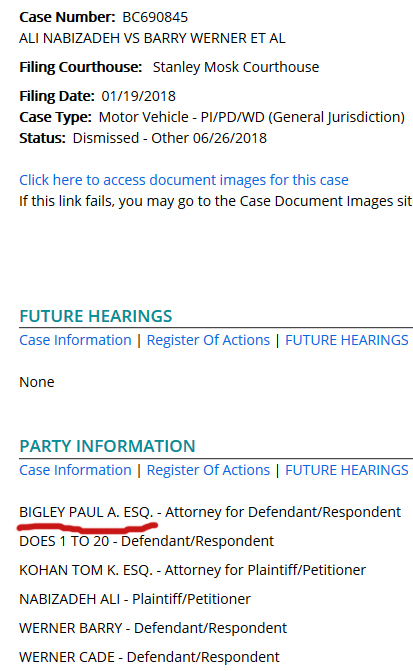
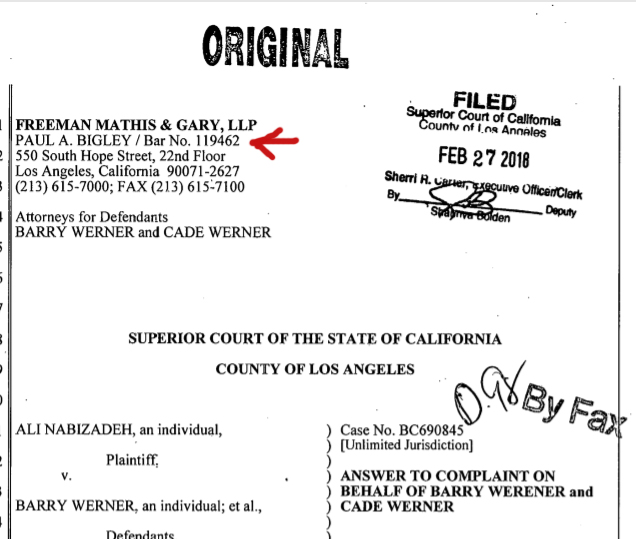


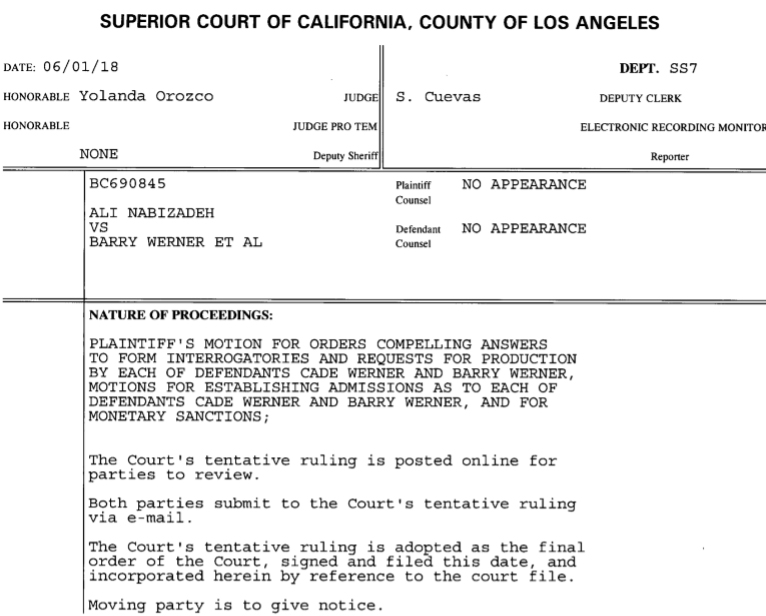

"Bottom line, everything had to do with another lawyer no longer in our office. I think you will find electronic signatures on everything tied to me. Should never have happened. That said, 'the buck stops here' as they say ;-)"
"I did nothing wrong here. I got railroaded, unfortunately 😉 In 35 years of practice, I have NEVER had this happen. I enjoy a Martindale Hubbel 'AV' rating (pier reviewed). I am a very active litigator with 15 jury verdicts in last few years alone."
"As you can see from the court docket, the entire action was dismissed within a short time of the court order. While my name appeared on the pleadings, I was not the handling attorney. That attorney is no longer with the firm."
Mr. Bigley is the only attorney for his firm listed in the court records.
After receiving Mr. Bigley's response we purchased additional official court records about the case, including part of a declaration made under penalty of perjury by the other attorney:
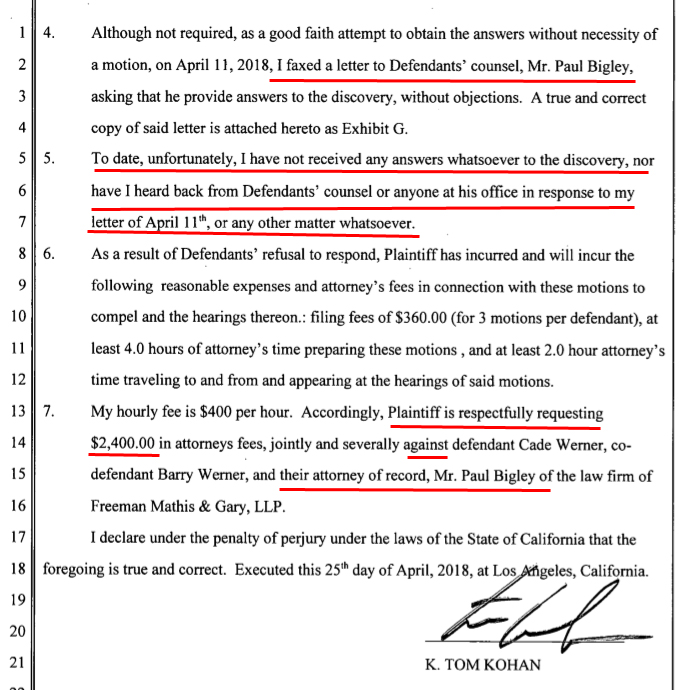
In this declaration the attorney states:
- Paul Bigley was defendant's attorney of record.
- He was communicating with Mr. Bigley directly.
- He received no response from Mr. Bigley - or anyone else at his law firm.
- Sanctions were requested against Paul Bigley personally.
Would you hire Paul Bigley to be your attorney?
This is a weird situation. Bigley claims he was railroaded and this was the fault of another, former attorney at his law firm. Yet, was Bigley the managing partner?
The other attorney declared under penaty of perjury that Paul Bigley was defendant's attorney.
The other attorney also declared he was communicating directly with Paul Bigley.
The other attorney requested sanctions against Paul Bigley - personally.
The sanction amount is large, we are concerned there was no response to discovery, no request for an extension, no objections to preserve client rights, no response to a meet and confer letter, and no opposition to a sanctions motion with facts being deemed admitted against a client.
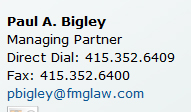
It also appears Mr. Bigley is the managing partner of his law firm. He is not a green rookie attorney.
As noted in the next section, it also appears that the attorney's Bar information is incorrect or out of date.
Bottom line: we would be concerned about hiring the Freeman Mathis Gary law firm which was seemingly unresponsive in a case - with so many opportunities to address an issue - who is also seemingly derelict in listing their employer with the Bar - and then later comes forward stating another attorney was responsible.
Paul Bigley was admitted to the California Bar in 1985. Bar Number 119462.
Per the State Bar:
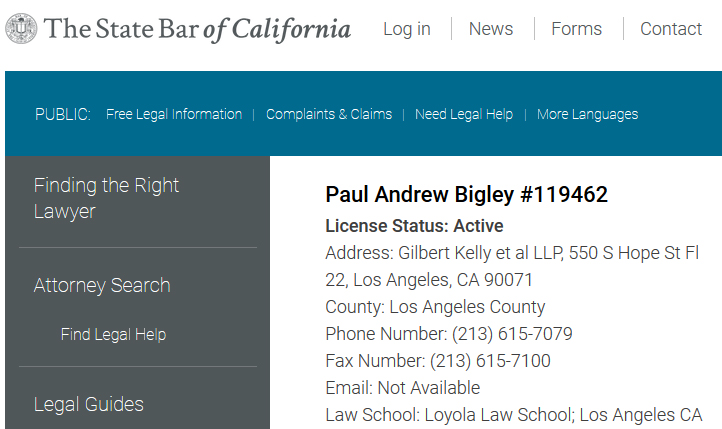
Gilbert Kelly et al LLP
550 South Hope Street Floor 22
Los Angeles, California 90071
Per the Court File:
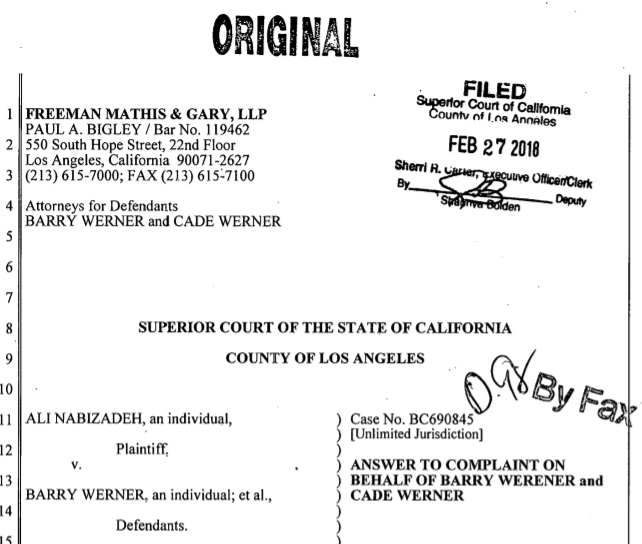
Freeman Mathis & Gary, LLP
550 South Hope Street Floor 22
Los Angeles, California 90071
Law School: Loyola Law School
What is going on with the difference in law firms between what the California State Bar is reporting and what is listed with the Los Angeles Superior Court?
The State Bar says Paul Bigley is employed by Gilbert Kelly. The case documents say attorney Bigley is an employee of Freeman Mathis & Gary.
From our research it appears in April 2017 the Freeman Mathis & Gary firm acquired or merged with Gilbert Kelly.
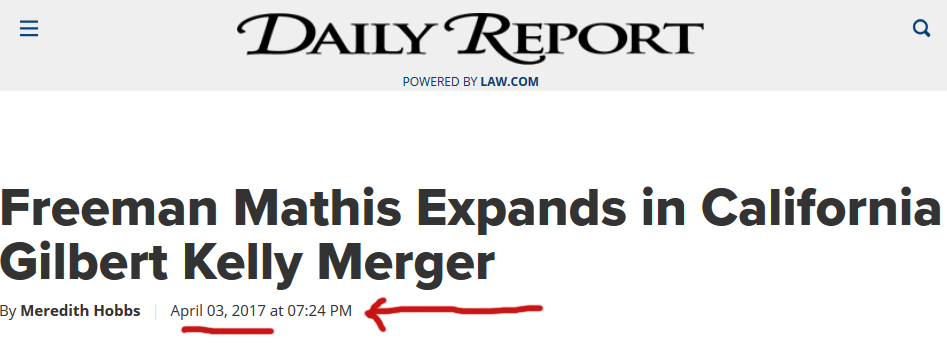
The State Bar information, though is dated August 2018, sixteen months after the merger.
One might think an "on top of things" attorney would update their law firm and employment information.
Update: After Lawzilla reached out for comment it appears the bar record was updated, but Paul Bigley was unresponsive to our request.
Sanctions are Recoverable as a Judgment - Analysis of the little known fact that sanctions awarded in a lawsuit can be enforced as their own separate judgment. Surprise someone by putting a lien on their bank account, home, wages, etc.